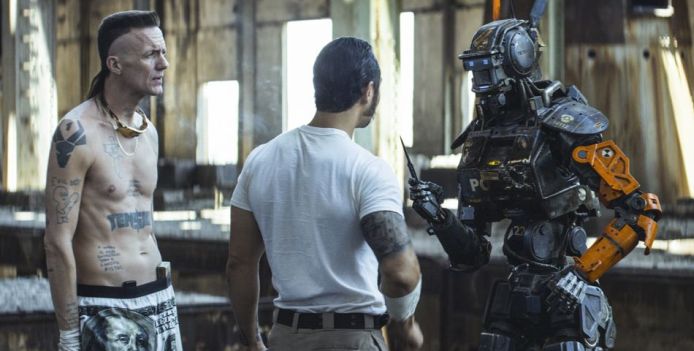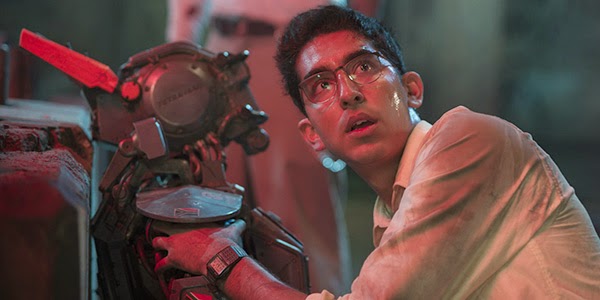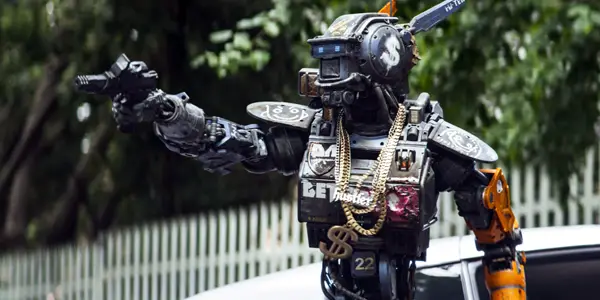CHAPPIE: An Unfocused Sci-Fi

David is a film aficionado from Colchester, Connecticut. He enjoys…
Neil Blomkamp is still a relatively new director in the game, though he has now done three movies. His first, District 9, is an intensely original feature, focusing on the subject of extraterrestrials who have come to Earth and suffer to live alongside the community of South Africa. It is at once both entertaining and politically charged, and was so well-received upon its release that it was even nominated for Best Picture at the Oscars, a very rare accomplishment for a sci-fi.
His next, Elysium, had more of a lukewarm reception. Though it had its its own moments and was a visually stunning work, as a whole it tried too hard to push its agenda. His latest film, Chappie, is about a self-aware robot that tries to come to terms with his “humanity,” with conflicts from the people around him who see him as a threat. Although mildly entertaining at times, especially in the beginning scenes when we first see Chappie come to life, the film suffers from an uneven storyline. It’s clear that Blomkamp had some good ideas in the film, but a good idea is just not enough.
Chappie comes to life
As I mentioned, the beginning moments of Chappie are easily the best of the film. It takes place in Johannesburg, South Africa, where a genius inventor named Deon Wilson (Dev Patel) has invented a robotic police squad, capable of stopping criminals with ease while also saving the human police from being in the line of fire. They are quick, efficient, and mindless creations – containing no semblance of humanity whatsoever.
Deon has an idea, though. What if they were to create a robot that could think and feel, just like a real person? Though the idea is shut down by his superiors at their company Tetravaal, he sets to work anyways, and soon creates Chappie (motion captured and voiced by Sharlto Copley). As a being capable of rational thought and emotion, Chappie also has the mentality of a child, and has to be taught how to talk and act and how to know right from wrong.

These initial moments of Chappie are wonderfully beautiful, and reminded me of other similar films, such as Wall-E or Short Circuit, where we see the emergence of a non-human being and start to attribute a sense of humanity and personality into it. Part of this is due to Sharlto Copley‘s fine voice job and motion capture work as the robot, as he is able to infuse a sense of childlike wonder into the role.
The idea of artificial life and the problems that come with it is not a new one, but it seems to be ever-prelevant in today’s world, and one that Blomkamp knows will someday be a reality. Unfortunately, though, the film stopped focusing primarily on Chappie and instead threw in a bunch of uninteresting subplots, which served as nothing more than irritating distractions.
Too many side-stories
One of these sub-plots concerns Vincent Moore (Hugh Jackman), who has his own ideas for robots and tries to do anything he can for his invention, called the Moose, to be the primary product of Tetravaal. Essentially, he is set up to be the bad guy, and we know this from almost the first few minutes of the film. But although Jackman is okay in the role (he even gets to talk in his regular Australian accent), his character is flat and devoid of any kind of charisma. The motivations for Moore are clear, but he goes to extremes to get there, putting peoples’ lives in jeopardy in the process. It is not the type of thing that is even remotely believable for a person to do (even a bad guy).

Also, is there no security at a high-tech facility that creates advanced, dangerous robots? Maybe I’m nitpicking here, but there were several moments in Chappie when I asked that age-old question: “Come on, really?” And in a film that is meant to be based on hard science, it should at least be something that we would want to suspend our disbelief for.
Chappie is chock-full of loose ends, and Blomkamp should have spent more time on tying them up than on unnecessary stories about back-alley criminals and a psychopath with a giant robot. Also, Sigourney Weaver is in this film, and her character is essentially pointless by the end. How could you even make Sigourney Weaver boring in a science fiction movie?
Unfocused narrative
Chappie should have just been about Chappie himself, and had been something like a Frankenstein-ish story of a robot that has just come alive and does not yet know right from wrong. Blomkamp does delve into these ideas to a certain extent, such as when the trio of criminals that basically adopt him try to use him to their advantage in order to pull off a heist. Since Chappie does not yet know that it’s wrong to do, he willingly goes along with it, simply because he wants to feel as if he belongs somewhere. And while this makes sense at first, how could Chappie still be naïve even towards the end of the film?

He never really seems to come to a sense of who he is and what it means to be alive, especially once the film becomes a nonstop action spectacle by the final chapter. And don’t even get me started about what happens in the last few minutes, which made such little sense that I was actually angry. It completely ruined even that final ounce of entertainment that was still just barely lingering. What happened to you, Chappie? You used to be cool.
Conclusion
I recently heard someone assign Chappie as this year’s Lucy, a film from last year which I absolutely could not stand. It thankfully doesn’t get into the same “laughably bad” genre as Lucy, but I still think it could have been so much better. Hopefully Blomkamp‘s next film, a sequel of the Alien franchise, doesn’t suffer from the same problem.
(top image source: Columbia Pictures)
Does content like this matter to you?
Become a Member and support film journalism. Unlock access to all of Film Inquiry`s great articles. Join a community of like-minded readers who are passionate about cinema - get access to our private members Network, give back to independent filmmakers, and more.
David is a film aficionado from Colchester, Connecticut. He enjoys writing, reading, analyzing, and of course, watching movies. His favorite genres are westerns, crime dramas, horror, and sci-fis. He also enjoys binge-watching TV shows on Netflix.













